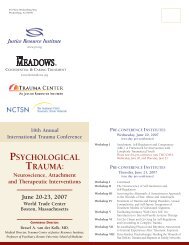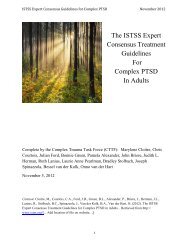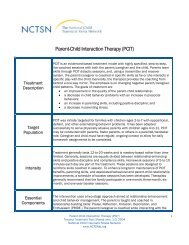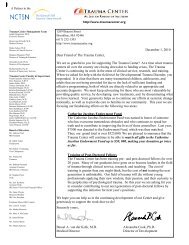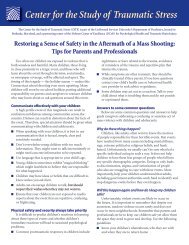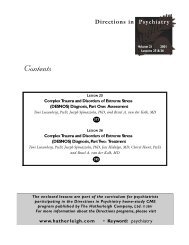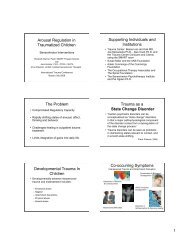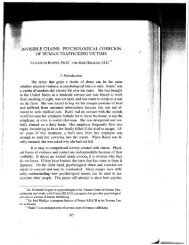Treatments for PTSD Types of treatment - The Trauma Center
Treatments for PTSD Types of treatment - The Trauma Center
Treatments for PTSD Types of treatment - The Trauma Center
You also want an ePaper? Increase the reach of your titles
YUMPU automatically turns print PDFs into web optimized ePapers that Google loves.
<strong>Treatments</strong> <strong>for</strong> <strong>PTSD</strong><br />
Several <strong>treatment</strong> options are available <strong>for</strong> people experiencing symptoms <strong>of</strong> Post <strong>Trauma</strong>tic Stress.<br />
Whether it is individual, group, pharmacotherapy (medication) or a combination <strong>of</strong> these, <strong>treatment</strong> has<br />
been proven to be effective much <strong>of</strong> the time and can help a person get back to their regular routines and<br />
healthy functioning.<br />
<strong>Types</strong> <strong>of</strong> <strong>treatment</strong><br />
Individual Psychotherapy<br />
This involves meeting one on one with a licensed Psychologist, Social Worker or Mental Health<br />
Counselor. Typically these meetings are once a week <strong>for</strong> an hour and focus on talking about the events,<br />
your reactions to them and means <strong>of</strong> mitigating the effects on your life. <strong>The</strong> types <strong>of</strong> modalities therapists<br />
use may include:<br />
Behavioral or Cognitive Behavioral <strong>The</strong>rapy (CBT)<br />
This <strong>treatment</strong> approach looks at ways in which a person thinks about a problem, their learned<br />
responses to certain triggers associated with that problem and ways in which their thinking affects their<br />
emotional state. This <strong>treatment</strong> <strong>of</strong>ten uses a combination <strong>of</strong> exposure (deliberately thinking about an<br />
event or confronting a trigger) and relaxation training along with cognitive restructuring or changing one’s<br />
thoughts or beliefs about an event or trigger. This process tends to “desensitize” a person’s response to<br />
reminders <strong>of</strong> the event so that it no longer carries the same emotional impact. CBT has been well<br />
researched and has been shown to be an effective <strong>treatment</strong> <strong>for</strong> <strong>PTSD</strong>.<br />
Eye Movement Desensitization and Reprocessing (EMDR)<br />
This <strong>treatment</strong> modality uses exposure to the traumatic memory paired with “bilateral stimulation”<br />
<strong>of</strong> the brain by tracking the therapist’s finger or string <strong>of</strong> lights with the eyes or listening to alternating<br />
tones. Current thoughts, feelings, physical sensations and beliefs are activated and the tracking helps to<br />
reduce emotional and physiological reaction to the memory. This desensitization helps the person to<br />
reprocess their negative beliefs about themselves (<strong>for</strong> example “It was my fault”) to adaptive, healthy and<br />
more accurate beliefs (“I did the best I could”). <strong>The</strong>re have been numerous studies on EMDR over the<br />
past fifteen or more years and it has been shown to be a rapid and effective <strong>treatment</strong> <strong>for</strong> <strong>PTSD</strong>.<br />
Group therapy<br />
Group therapy can be very helpful following a traumatic event as it provides a safe and supportive<br />
environment in which to discuss a shared experience with others. <strong>The</strong>re is <strong>of</strong>ten a felt sense that “nobody<br />
understands” and a group can help you to feel less alienated, normalizing your reactions to an abnormal<br />
event.<br />
Medication<br />
People are <strong>of</strong>ten very leery <strong>of</strong> about medication feeling it signifies that they are “crazy” or out <strong>of</strong><br />
control. This is, <strong>of</strong> course, not the case and many people take medication <strong>for</strong> varying lengths <strong>of</strong> time<br />
following particularly stressful life events. <strong>Trauma</strong>tic events can influence the neurochemistry <strong>of</strong> the body<br />
and brain impacting a person in many ways. Excessive stress hormones can make it difficult to<br />
concentrate, relax or even sleep. <strong>The</strong>y can increase blood pressure, muscle tension, skin conductance<br />
and general arousal levels. It can impair immune system functioning, making people more vulnerable to<br />
illness. Fairly <strong>of</strong>ten these changes can lead to depression or anxiety. Medication can be effective in<br />
resetting the levels in the brain and may prove to be very helpful <strong>for</strong> a period <strong>of</strong> time. Some types <strong>of</strong><br />
medication may include:<br />
This resource guide was produced at the <strong>Trauma</strong> <strong>Center</strong>, with the funding <strong>of</strong> the Massachusetts Office <strong>for</strong> Victim Assistance (MOVA), under a<br />
federal Anti-Terrorism Supplemental Grant (ATSG), to aid Victims <strong>of</strong> and Responders to the 9/11 Terrorist Attacks. It is not intended to<br />
supplant pr<strong>of</strong>essional support.
Anxiolitic (Anti-anxiety) Medication. Include medications such as Xanax or Ativan. <strong>The</strong>se tend<br />
to be short lasting medications that help to reduce physiological and emotional arousal and irritability<br />
associated with <strong>PTSD</strong>.<br />
Antidepressants. <strong>The</strong>se are medications such as Prozac, Paxil or Zol<strong>of</strong>t. Research has shown<br />
these medications to be effective in helping to reduce overall <strong>PTSD</strong> symptoms including irritability,<br />
depressed or anxious moods, anger, impulsivity and obsessive thoughts.<br />
Adrenergic agents. This class <strong>of</strong> medication includes Propranolol and Clonadine. <strong>The</strong>se act on<br />
the adrenal system and help to lower overall arousal levels, control intrusive images, memories and<br />
nightmares.<br />
<strong>The</strong>re are many variables to consider in one’s decision to take or <strong>for</strong>ego medication and only a medical<br />
doctor can prescribe them. A consultation with a psychiatrist can help to provide you with the in<strong>for</strong>mation<br />
necessary to make an in<strong>for</strong>med choice in this matter. Remember, the choice to take medication is always<br />
up to you.<br />
Finally, in choosing a <strong>treatment</strong> provider <strong>for</strong> any <strong>of</strong> the <strong>treatment</strong>s listed above you want to know certain<br />
things about the person you will be seeing. A good therapeutic relationship is very important to positive<br />
outcome in therapy. You will find a referral source in the links page, and when you contact someone ask<br />
them several questions about their training and experience in the field <strong>of</strong> traumatic stress including:<br />
• What is your <strong>for</strong>mal training background?<br />
• What specific training have you had in the area <strong>of</strong> trauma?<br />
• How long have you been doing this work and with how many people?<br />
• What is your <strong>treatment</strong> philosophy and approach (methods)?<br />
• How will we know when we are finished?<br />
As a client in a therapy relationship you have the right to be involved in <strong>treatment</strong> planning and to set your<br />
own goals <strong>for</strong> the <strong>treatment</strong>.<br />
This resource guide was produced at the <strong>Trauma</strong> <strong>Center</strong>, with the funding <strong>of</strong> the Massachusetts Office <strong>for</strong> Victim Assistance (MOVA), under a<br />
federal Anti-Terrorism Supplemental Grant (ATSG), to aid Victims <strong>of</strong> and Responders to the 9/11 Terrorist Attacks. It is not intended to<br />
supplant pr<strong>of</strong>essional support.




